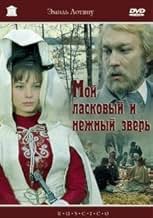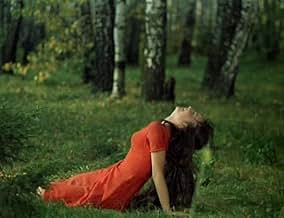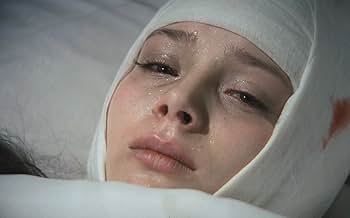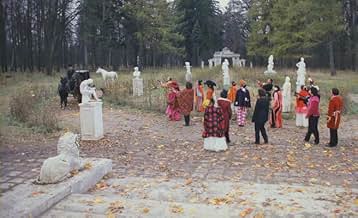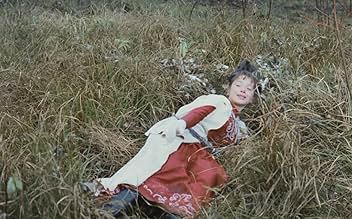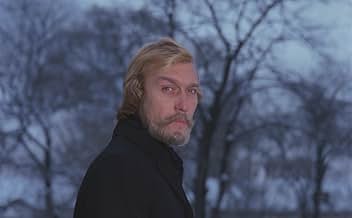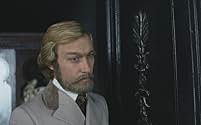Moy laskovyy i nezhnyy zver
- 1978
- 1h 49m
ÉVALUATION IMDb
7,3/10
1,2 k
MA NOTE
Ajouter une intrigue dans votre langueA romantic drama in which a beautiful but poor young woman has to choose between three suitors: an old widower, a decadent nobleman and a handsome but poor young man.A romantic drama in which a beautiful but poor young woman has to choose between three suitors: an old widower, a decadent nobleman and a handsome but poor young man.A romantic drama in which a beautiful but poor young woman has to choose between three suitors: an old widower, a decadent nobleman and a handsome but poor young man.
- Prix
- 1 nomination au total
Galina Belyaeva
- Olga Skortsova
- (as Galya Belyaeva)
Grigore Grigoriu
- Polikhroniy Kalidis
- (as Grigori Grigoriu)
Vasyl Symchych
- Nikolay Skortsov
- (as V. Simchich)
Olegar Fedoro
- Publisher
- (as Oleg Fedorov)
Aleksandr Zvenigorsky
- Lakey
- (as A. Zvenigorodskiy, Aleksandr Zvenigorskiy)
Anna Petrova
- Sasha Urbenina
- (as Anya Petrova)
Vladimir Matveev
- Volodya Urbenin
- (as Volodya Matveev)
Valeri Sokoloverov
- Polikarp
- (as V. Sokoloverov, Valeriy Sokoloverov)
Georgiy Khasso
- Barin na okhote
- (as G. Khasso)
Galina Ivanova
- Barynya
- (as G. Ivanova)
Amaliya Rozmeritsa
- Barynya
- (as A. Rozmeritsa)
Mariya Zorina
- Sychikha
- (as M. Zorina)
Histoire
Le saviez-vous
- ConnexionsFeatured in Legendy mirovogo kino: Emil Loteanu
Commentaire en vedette
This was my first foray into Russian - or to be strict, Soviet - cinema. It is not a kind of cinema that the West knows very well, and I only became aware of this film thanks to its magnificent soundtrack. I was not badly impressed, and I confess that I was in the mood to find Anton Chekhov's original book to read it too.
The story is set in the countryside, where Count Karneyev, a noble landowner, lives. On a day when he was strolling through his hunting grounds with two friends - the widower Urbenin and the young bailiff Kamyshev - the group is surprised by a thunderstorm and has to take shelter in the house of a forest guard. It turns out that this guard has a very young and beautiful daughter, Olga, who grew up freely and whose spontaneity and beauty captures the attention of the three men. Desiring to get a comfortable life, Olga decides to marry Urbenin, but soon realizes that she loves Kamyshev, and the two end up having an affair, in a story that will turn into a tragedy marked by crossed passions and jealousy.
Deep, melancholic, sometimes dramatic, Emil Loteanu's film is pleasant and deserves our best attention. Setting the plot in the final reigns of Tsarism, the film takes the opportunity to criticize the "modus vivendi" of the Russian elite of the time, to the taste of Soviet thinking: trapped in a way of life that has both dissolute and absurd, the rich - be they aristocrats or bourgeois - are selfless debauched who care little for the harshness of the lives of the poor or even their own servants, placed to serve as chandeliers, as objects that can be disposed of. Criticism of marriage for convenience is also present, as is the warning of the danger that young women pose to more mature men. In fact, Olga is a character who is far from being innocent, despite her youth: she is the almost intentional pivot of the web of jealousy and crossed passions where she entangles herself, creating her fatal destiny through her attitudes.
The cast is headed by Galina Belyaeva. Extremely young, only 16, she is fair, attractive, captivating, charismatic and perfect for the role. And as life tends to imitate art, Loteanu proved unable to resist her, despite being much older than her at the time of filming. They would be married two years later, for a short time. With the young Russian actress - who became an icon at the time - they also star Oleg Yankovsky, Kirill Lavrov and Leonid Markov. They are quite good and do an interesting work, but it is undoubtedly Belyaeva who stands out.
Technically, the film is quite simple: cinematography has nothing special, and I even thought that some shooting angles and camera movements seem too rough, they are not as subtle as would be desirable. The sets and costumes are quite good, and they emphasize all the features I already mentioned: the ranger's hut shows the simple and hard life of the poor, Olga's costumes follow the evolution of her character (from the simple girl in the forest to a lady) and the shabby mansion express well the decadence of the Russian aristocracy. The soundtrack, which I mentioned at the beginning, contains iconic melodies by Eugene Doga, especially a specific wonderful waltz.
The story is set in the countryside, where Count Karneyev, a noble landowner, lives. On a day when he was strolling through his hunting grounds with two friends - the widower Urbenin and the young bailiff Kamyshev - the group is surprised by a thunderstorm and has to take shelter in the house of a forest guard. It turns out that this guard has a very young and beautiful daughter, Olga, who grew up freely and whose spontaneity and beauty captures the attention of the three men. Desiring to get a comfortable life, Olga decides to marry Urbenin, but soon realizes that she loves Kamyshev, and the two end up having an affair, in a story that will turn into a tragedy marked by crossed passions and jealousy.
Deep, melancholic, sometimes dramatic, Emil Loteanu's film is pleasant and deserves our best attention. Setting the plot in the final reigns of Tsarism, the film takes the opportunity to criticize the "modus vivendi" of the Russian elite of the time, to the taste of Soviet thinking: trapped in a way of life that has both dissolute and absurd, the rich - be they aristocrats or bourgeois - are selfless debauched who care little for the harshness of the lives of the poor or even their own servants, placed to serve as chandeliers, as objects that can be disposed of. Criticism of marriage for convenience is also present, as is the warning of the danger that young women pose to more mature men. In fact, Olga is a character who is far from being innocent, despite her youth: she is the almost intentional pivot of the web of jealousy and crossed passions where she entangles herself, creating her fatal destiny through her attitudes.
The cast is headed by Galina Belyaeva. Extremely young, only 16, she is fair, attractive, captivating, charismatic and perfect for the role. And as life tends to imitate art, Loteanu proved unable to resist her, despite being much older than her at the time of filming. They would be married two years later, for a short time. With the young Russian actress - who became an icon at the time - they also star Oleg Yankovsky, Kirill Lavrov and Leonid Markov. They are quite good and do an interesting work, but it is undoubtedly Belyaeva who stands out.
Technically, the film is quite simple: cinematography has nothing special, and I even thought that some shooting angles and camera movements seem too rough, they are not as subtle as would be desirable. The sets and costumes are quite good, and they emphasize all the features I already mentioned: the ranger's hut shows the simple and hard life of the poor, Olga's costumes follow the evolution of her character (from the simple girl in the forest to a lady) and the shabby mansion express well the decadence of the Russian aristocracy. The soundtrack, which I mentioned at the beginning, contains iconic melodies by Eugene Doga, especially a specific wonderful waltz.
- filipemanuelneto
- 8 févr. 2021
- Lien permanent
Meilleurs choix
Connectez-vous pour évaluer et surveiller les recommandations personnalisées
- How long is The Shooting Party?Propulsé par Alexa
Détails
- Date de sortie
- Pays d’origine
- Site officiel
- Langue
- Aussi connu sous le nom de
- The Shooting Party
- Lieux de tournage
- sociétés de production
- Consultez plus de crédits d'entreprise sur IMDbPro
- Durée1 heure 49 minutes
Contribuer à cette page
Suggérer une modification ou ajouter du contenu manquant

Lacune principale
By what name was Moy laskovyy i nezhnyy zver (1978) officially released in Canada in English?
Répondre
